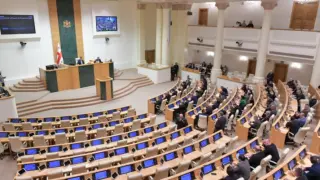The Georgian Dream approved the draft law on amendments to the Code of Administrative Offences in its third hearing on 13 December 2024. The changes introduced new offences, tightened sanctions for existing ones and expanded the list of grounds for administrative detention, personal searches, searches of belonging and the seizure of items and documents.
The primary focus of the legislative package was on offences committed in -+the context of exercising freedom of expression – particularly during protests.
The fines for these offences rose to a degree that is entirely disproportionate to the country’s socio-economic reality. For reference, the average monthly salary for an employed person amounted to GEL 1,385 whilst the median salary stood at GEL 971 (Source – National Statistics Office of Georgia; 2024 data has not yet been published).
For instance, violations of several provisions of the Law of Georgia on Assemblies and Demonstrations – including those related to the partial or complete blocking the traffic roadway by protest participants – will be punishable by a fine of GEL 5,000 (instead of the previous GEL 500) or up to 15 days of administrative detention under the new wording. The fine further increases to GEL 15,000 (as compared to the initial GEL 5,000) or administrative detention of the same duration if the violator is an organiser. Additionally, a new Part 5 has been added to Article 1741 which stipulates that possession of laser or sharp radiation devices, as well as covering one’s face with a mask or any other means, will result in a fine of GEL 2,000.
For more information on the amendments to the Code of Administrative Offences, see the FactCheck article.
A blanket ban on wearing masks at peaceful assemblies constitutes a disproportionate restriction on freedom of assembly according to international practice – see FactCheck’s information cards for details.
Local civil society organisations argue that disproportionately high fines and the frequency of their application are intended to intimidate protest participants, weaken demonstrations and create financial obstacles for those involved. They note that the use of severe financial sanctions against demonstrators is effectively equivalent to imposing criminal liability.
Administrative punishment is intended to educate the perpetrator of an offence in spirit of lawfulness, respect for societal norms and to prevent the commission of new offences by both the offenders and others, according to the Code of Administrative Offences.
However, the emphasis in the revised version clearly shifts toward “preventing the commission of new offences by other persons.” This reflects a general prevention objective similar to that of criminal punishment where the imposition of a coercive state measure serves an “exemplary” or demonstrative function for society.
The Constitutional Court of Georgia explicitly stated in one of its significant rulings – Georgian Citizen Beka Tsikarishvili v. Parliament of Georgia – “the purpose of punishing a person cannot be solely to intimidate others, to warn them and thereby reduce the likelihood of similar offences. In other words, general prevention alone cannot justify the application of any punishment, as such an approach turns the individual into a ‘tool of intimidation’ in the hands of the state, a mere object of coercive threat, which is impermissible in a state governed by the rule of law.”
The Court takes a similar approach to administrative penalties. According to established practice, “whilst the legislator enjoys broad discretion in determining the type, scope and severity of an administrative penalty, this discretion is not unlimited. When specifying a particular type of administrative sanction, the legislator is obligated to adhere to the principle of proportionality. A legally prescribed administrative penalty must not be evidently unreasonable or disproportionate means of achieving the intended objective and must not result in a violation of an individual’s constitutional rights and freedoms. The legislator must always aim to appropriately match each administrative penalty to conduct that infringes on the rights of individuals or harms society.”
The clear disproportionality between the severity of certain offences and the penalties imposed is further evidenced by the legislator’s failure to properly calibrate the sanctions. The risks posed by the offences were not adequately assessed. For example, the partial or full blockage of a roadway may cause public inconvenience but does not inherently pose a threat to human health, life or other essential interests.
A sanction of up to GEL 5,000 – or exactly GEL 5,000 – has been imposed for violations that pose significantly greater risks to society. These include non-compliance with a medical care license and permit conditions (Article 445), dumping isolated ballast water into the sea from a ship with up to 20,000 tonnes of total capacity in violation of the rules laid down by the legislation of Georgia (Article 582) and the violation of the regulations for erecting and operating radio-electronic devices and high-frequency equipment (Article 1444).
The intent to use the amendments as a tool of power becomes apparent given their scope and evident disproportionality of the sanctions.
The Gnomon Wise publication, Georgian Analogue of the Russian Practice of Post-Fact Arrest of Demonstrators, observes that the harshest legislation imposes such severe sanctions that, once applied, they take a criminal character. Against this backdrop, the law grants law enforcement broad discretion to determine whether or not a violation occurred – for instance, if enough people were present to constitute a road blockage or if grounds for detention exist. The document also notes that “courts often fail to meet even the minimum standards for reviewing cases as outlined in the Code of Administrative Offences. Courts issue forced rulings through biased and formal examination of evidence or delay hearings in cases involving protest-related offences in a way that leaves both the individual protester and others in a state of prolonged uncertainty.”
The violation of the right to a fair trial is addressed in GYLA’s report, entitled Civil Rights Facing Increased Police Terror. According to the report, “some individuals were not arrested during the protests but either in the streets after the protest had ended or during the following days near their houses. Court proceedings disregard the right to fair trial and evidence presented by victims to refute these false testimonies is disregarded by judges.” The fact that the Court found all 114 individuals whose cases it reviewed as of 9 December guilty and imposed severe sanctions – including administrative detention, fines and warnings – is further indicative of concerning judicial tendencies.
Freedom of opinion and expression is “thwarted” if a person, fearing an impending sanction, is compelled to refrain from fully exercising that right, according to established case law of the Constitutional Court of Georgia.
“Such regulation of the sphere of freedom of expression may lead to the unjustified closure of society, self-restraint in the exercise of freedoms and self-censorship in areas of expression that do not warrant restriction – amounting, in itself, to a disproportionate limitation of the right.”
The Venice Commission and OSCE/ODIHR Guidelines on Peaceful Assembly emphasise that sanctions for actions committed in the context of an assembly must be necessary and proportionate to avoid creating a “chilling effect” that deters individuals from exercising their right to protest. Offences such as failure to give prior notice of an assembly or failure to comply with restrictions on its route, time or location should not be subject to imprisonment or excessive fines, according to the Guidelines.
The Guidelines, drawing on the case law of the European Court of Human Rights (ECtHR), state that “participation in a peaceful assembly, even without a permit, should never be considered a serious offence warranting a heavy penalty.” The ECtHR notes that “whilst rules governing public assemblies, such as the system of prior notification, are essential for the smooth conduct of public events since they allow the authorities to minimise the disruption to traffic and take other safety measures, the Court emphasises that their enforcement cannot become an end in itself.” Furthermore, the Court has held that individuals should not be penalised for participating in an unlawful assembly if they were unaware of its unlawful nature.
Considering all the above, it is evident that the amendments to the Code of Administrative Offences contradicts both domestic legal practice and international obligations. Disproportionately high fines – amounting to de-facto criminal liability – impose additional and unjustified restrictions on freedom of expression, disregarding the purpose, meaning and function of administrative penalties and effectively turning individuals into objects of state coercion. This is particularly concerning in the context of alleged systematic violations of the right to a fair trial where decisions are made without considering evidence presented by the detainees and are instead based primarily on unreliable testimony from police witnesses.
Editor’s Note:
Mamuka Mdinaradze announced further legislative amendments during a media interview on 3 February 2025 following the preparation of this article. The proposed changes, as presented, would significantly worsen the state of freedom of expression and create additional tools for the prosecution of citizens critical of the government. FactCheck will provide analysis of the announced amendments in due course.
[1] The requirements set out in Article 9, Article 11 (excluding subparagraphs a1 and a2 of Paragraph 2) and Article 111 of the Law of Georgia on Assemblies and Demonstrations pertain to prohibitions on holding assemblies or demonstrations within a 20-meter radius of buildings such as the Prosecutor’s Office, police stations, penitentiary institutions and other law enforcement agencies. These provisions also apply to assemblies or demonstrations that, for instance, contradict the pseudo-requirements of the homophobic Law on Family Values and the Protection of Minors, call for the overthrow of the constitutional order of Georgia, involve possession of firearms or objects dangerous to life and health or result in the partial or complete blocking of the traffic roadway by participants, etc.
[2] Constitutional Court of Georgia, Decision No. 1/4/592, 24 October 2015, Georgian Citizen Beka Tsikarishvili v. Parliament of Georgia, First Panel, para. 52.
[3] Ibid.
[4] Constitutional Court of Georgia, Decision No. 4/482,483,487,502, 10 November 2010, Minutes of the Case Citizens’ Political Union Movement for a United Georgia, Citizens’ Political Union Conservative Party of Georgia, Citizens of Georgia – Zviad Dzidziguri and Kakha Kukava, Georgian Young Lawyers’ Association, Citizens – Dachi Tsaguria and Jaba Jishkariani, Public Defender of Georgia v. Parliament of Georgia, section II-8.
[5] GYLA – Civil Rights Facing Increased Police Terror, available at [link]
[6] Ibid., p. 33
[7] Constitutional Court of Georgia, Decision No. 2/2/516,542, 14 May 2013, section II-8
[8] Ibid.
[9] EUROPEAN COMMISSION FOR DEMOCRACY THROUGH LAW (VENICE COMMISSION) OSCE OFFICE FOR DEMOCRATIC INSTITUTIONS AND HUMAN RIGHTS (OSCE/ODIHR) GUIDELINES ON FREEDOM OF PEACEFUL ASSEMBLY (3rd EDITION); link , para. 46
[10] Primov and Others v. Russia (2014), op. cit., note 30, para. 118.
[11] See footnote 442 in the Guideline.







